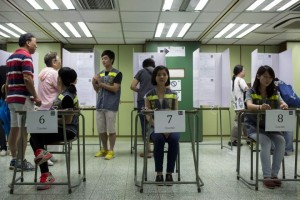Hong Kong defies Beijing with a consultation on universal suffrage
Tuesday, June 24th, 2014 9:41:37 by Jamshed Sindhu
Nearly 700,000 people have passed through the polls, physical or virtual, in Hong Kong since last Friday to participate in the referendum called for by the Occupy Central pro civil liberties movement to reclaim the public to appoint the head of the local government elections 2017, as Beijing has promised. The Chinese government has flatly rejected the call and assured that the consultation lacks constitutional basis and is ” illegal and invalid “.
The polls, fifteen sites located in the former British colony, will remain open until Sunday 29th. Any Hong Kong resident can participate in the referendum, either by physical or electronic voting, through a website created for the occasion. According to Occupy Central, who claims that the website has suffered a massive cyberattack apparent Chinese origin, on Sunday afternoon the number of participants and reached 670,000. It is a significant proportion of the 7.2 million inhabitants in the autonomous region that has surprised the organizers, which started from a target of 100,000 voters.
The referendum, which is not binding, asks participants to choose between three different models for implementing universal suffrage in the next elections, scheduled for 2017. Each model has been proposed by a party or civic association. Also question whether to veto any attempt to reform that does not include universal suffrage.
At present, the leading Executive of Hong Kong is decided by the vote of a committee of nearly 1,200 people, businessmen and notables of the former colony, most supporters of the central government. After Britain returned the territory to China in 1997, Beijing pledged in 2007 to allow some form of universal suffrage by 2017.
Already in 2012, the University of Hong Kong, which together with the Polytechnic of Hong Kong has been appointed to develop a page for voting, and Public Opinion whose department is responsible for analyzing the results of the referendum, had organized an informal consultation citizens to give their opinion on the possibility of direct vote, but then in the office less than 300,000 people participated.
This time, the referendum takes place amid growing tensions between the former colony and the central government. Two weeks ago, the central government published a White Paper in which it warned that former colony Hong Kong lacks the ” full autonomy.” The 14,500 -page document, published by the Information Office of the State Council, turn came days after more than 100,000 people demonstrated in Hong Kong to demand more freedoms. On June 4, had gathered about 180,000 people, according to organizers, in a central park of the former colony to mark the 25th anniversary of the Tiananmen massacre. And in February, about 6,500 journalists marched through the streets of the enclave to protest what they saw as a growing pressure against press freedom in the autonomous region.
The White Paper, which fell like a bucket of cold water between supporters of Occupy Central and groups demanding greater democracy and less central government control, said that many residents of the autonomous enclave are “confused or misunderstand” the principle of “one country, two systems” that regulates relations between Beijing and Hong Kong. Agreed by the then Chinese leader Deng Xiaoping, and it was British Prime Minister, Margaret Thatcher, in negotiations for the return of the enclave to China, the principle provides a “high degree of autonomy” for Hong Kong, with the exclusion of specific areas of foreign and defense under complete control of Beijing.
“The high degree of autonomy of the Special Administrative Region of Hong Kong does not amount to a complete decentralized power or autonomy,” the White Paper noted, adding that the enclave “has the power to manage local issues according to authorize the central power.”
Apparently, many of the voters who have flocked to the call for Occupy Central – a movement born on the model of initiatives such as Occupy Wall Street, and threatens to collapse the streets of Hong Kong by the end of the year if by then no progress has been made in universal suffrage did in response precisely the White Paper. Hong Kong’s independent newspaper “South China Morning Post” today quotes the statements of several voters to say that the central government document “galvanizes voters in the consultation on the 2017 elections.”
The query has the complete rejection of the local government of Hong Kong and Beijing. Hong Kong’s Justice Minister, Rimsky Yuen, claimed today that the vote ” can not be considered legally binding, much less be considered a referendum.” “For that reason, it can not be considered as nothing more than an expression of the opinion of the general public.”
Earlier, the head of the autonomous government, CY Leung, claimed that ” we hope to achieve universal suffrage in 2017, but the prerequisite is that it must comply with the Basic Law. “
In Beijing, the State Council pointed out that any referendum to take place is “illegal and invalid ” and has no basis in the Constitution. The official Chinese agency Xinhua described the call for “political farce.”
Short URL: https://www.newspakistan.pk/?p=45609

















